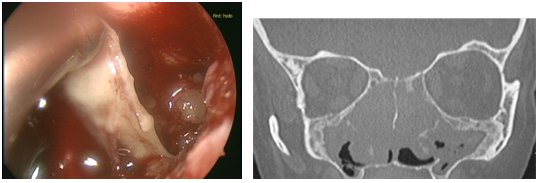Why Do My Sinuses Still Get Infected After Sinus Surgery
 |
Martin Desrosiers, MD, FRCSC. Clinical Professor. Program director, ORL-HNS Université de Montréal |
Patients who have undergone endoscopic sinus surgery (ESS) for management of chronic sinusitis (CRS) with or without nasal polyposis may nevertheless continue to have symptoms of chronic sinusitis and/or episodes of infection despite initially apparently successful sinus surgery. Several studies have shown that even well-performed sinus surgery can have recurrence of nasal polyps after surgery. In a study from Sweden, 50% of patients showed signs of recurrence of nasal polyps as early as five months after surgery.
Despite patient concerns, only rarely this a consequence of technical with performance of surgery. Chronic sinusitis, with or without nasal polyposis, is a chronic disease which reflects changes at the level of the sinus mucosa. While we don’t yet know everything about nasal polyposis, we do know that chronic sinusitis represents an ongoing form of inflammation, and that medication should be used to prevent recurrence of the inflammation. The reasons for this are multiple, and reflect the chronic nature of CRS and the factors underlying its development.

1. Medical treatment needs to be continued medication after surgery. Medication is usually required after sinus surgery to avoid recurrence of disease. If patients are not taking medication In the same study referred to earlier, patients who continued using an intranasal topical corticosteroid spray after ESS delayed return of the nasal polyps by an additional period of several months. Frequently, physicians will attempt to increase the effectiveness of this therapy by using sinus irrigations composed of salt water and corticosteroids mixed together. This underlines the importance of continuing therapy after ESS. and ensuring that you’re following physician recommendations faithfully.
2. The type of underlying inflammation may require treatment with an alternate type of anti-inflammatory therapy. It’s possible that the type of inflammation that drives your chronic sinusitis may be of a type that does not respond well to corticosteroids. Some patients have a form of inflammation which is neutrophilic, as opposed to eosinophilic in origin. Unfortunately this type of inflammation frequently does not respond as well to corticosteroids. While there is no magic bullet currently available for treatment of this condition, physicians will often try and use a alternate anti-inflammatory treatment, such as the macrolide antibiotic azithromycin taken at low doses for a several month period to help regain control.
3. Persistent low level bacterial infection. Another reason that may be at play is a persistent bacterial infection. The bacteria present in chronic sinusitis have a tendency to form a thick, tenacious film called a biofilm, which protects them by ‘hiding’ them from natural defence mechanisms and destruction by white blood cells and making them resistant to antibiotics. This may make these infections more difficult to clear and lead to persistent symptoms and recurrent infections. Occasionally, physicians will use a type of surfactant, or “soap” to try and get rid of these. One homemade recipe for this that is often used is a small quantity of baby shampoo in the sinus irrigation solution. However, this therapy is not for everyone and may carry some minor risks so it should only be used on the position of vice of course.
4. Recurrent viral infections triggering bouts of sinusitis. Exacerbations of your sinus condition may occur following exposure to viruses producing viral upper respiratory tract infections. Patients frequently exposed to viruses, such as daycare workers, elementary school teachers, and certain healthcare workers, as well as parents with children in day care, may have frequent “colds” which may unbalance the delicate balance of their sinus situation, leading to development of acute infection.
5. An underlying immune deficiency. Lastly, if you find your getting sick too often after surgery, there is a possibility that you may have a problem with your immune system which defends itself well against infection. While these conditions are rare, you should discuss this with your physician as specialised consultation and/or specific testing may be required to explore this possibility.
(51854)